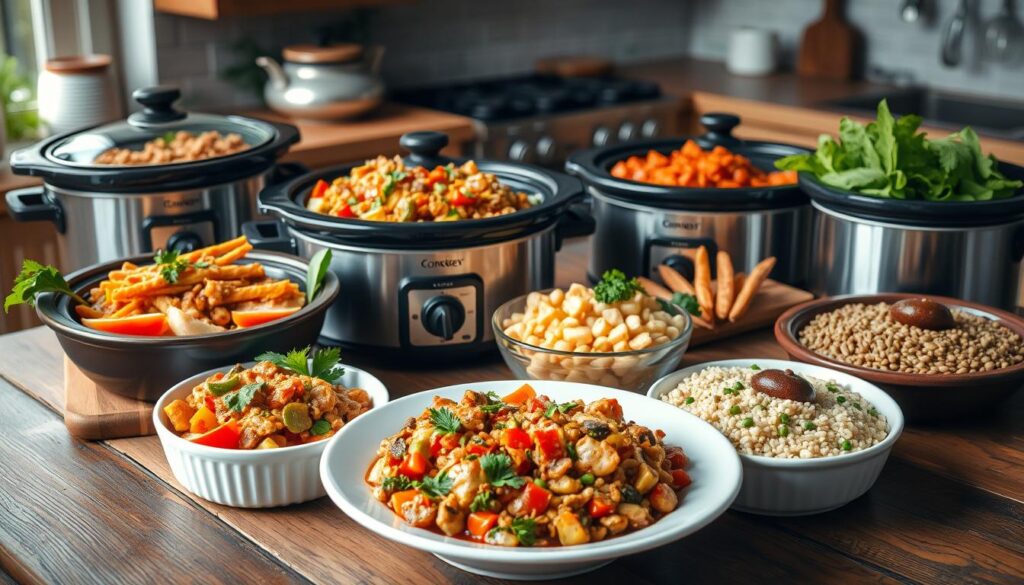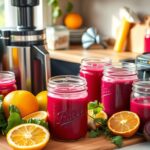I love using my crockpot for cooking. It’s easy and helps me make healthy meals for my family and me. With our busy lives, finding time to cook is hard. But, the crockpot makes it simple.
Crockpot recipes are a lifesaver on busy weeknights. They’re easy and healthy. Just add all the ingredients in the morning. When you get home, dinner is ready.
Why I Love These Healthy Crockpot Recipes
Healthy crockpot recipes have changed my life for the better. They are perfect for busy people, offering many benefits. With crockpot recipes for beginners, making tasty, healthy meals is easy and quick. This saves me a lot of time, letting me do other things I enjoy.
Some of the key benefits of healthy crockpot recipes include:
- Time-saving: Just add all the ingredients to the crockpot and let it cook while I’m busy with other tasks.
- Health advantages: These recipes use good ingredients like lean proteins, veggies, and whole grains. They are key for a healthy diet.
- Cost-effective meal solutions: Crockpot recipes are also budget-friendly. They use affordable ingredients and can feed many people.
If you’re new to easy meal prep, start with simple crockpot recipes. Many experts say crockpot recipes save time and money. They help me make healthy meals without spending too much time or effort.
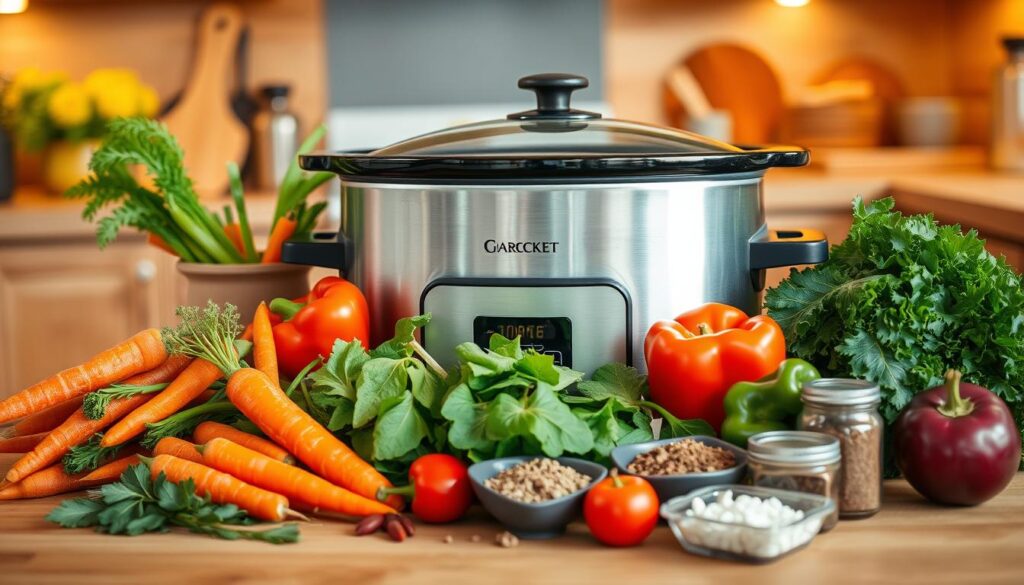
I highly recommend trying healthy crockpot recipes, even if you’re new to cooking or short on time. They offer many benefits and are easy to make. They’re a great choice for anyone wanting to eat well and save time.
Essential Ingredients for Your Healthy Slow Cooking
Choosing the right ingredients is key for nutritious slow cooking. Fresh and healthy ingredients make a meal both tasty and good for you. I focus on lean proteins, fresh veggies, and whole grains. These add flavor and nutrients for a balanced diet.
Using healthy ingredients makes meals both nourishing and delicious. My top picks for nutritious slow cooking are:
- Leafy greens like kale and spinach
- Colorful vegetables like bell peppers and carrots
- Lean proteins like chicken and turkey
- Whole grains like brown rice and quinoa
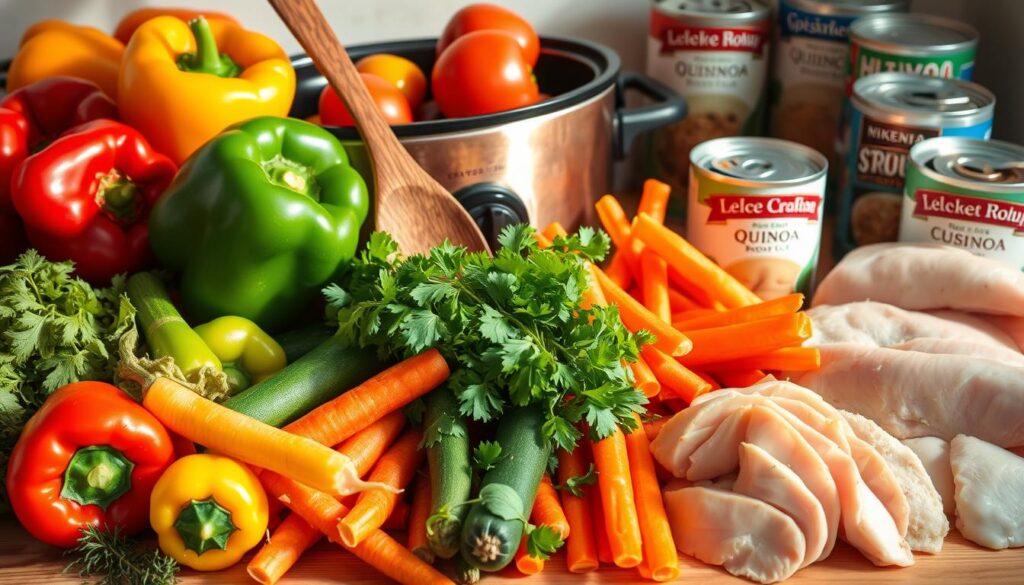
By adding these healthy ingredients to my nutritious slow cooking recipes, I make meals that are both tasty and healthy. Whether it’s for myself or my family, I know I’m giving them the best nutrition for a healthy life.
| Ingredient | Nutritional Benefit |
|---|---|
| Leafy Greens | Rich in vitamins and antioxidants |
| Colorful Vegetables | High in fiber and vitamins |
| Lean Proteins | Excellent source of protein and iron |
| Whole Grains | Rich in fiber and essential minerals |
Master Tips for Perfect Crockpot Meals
Exploring slow cooker tips, I found that knowing the basics is key. Experts say mastering these can greatly improve your cooking. It’s important to understand temperature control, timing, and food safety.
Temperature control is crucial in crockpot cooking. Make sure your slow cooker is at the right temperature. Timing your ingredients is also key to avoid overcooking or undercooking. These tips will help you make tasty, healthy meals.
Here are some essential tips to keep in mind:
- Always defrost your ingredients before adding them to the slow cooker
- Use the right amount of liquid to prevent overcooking or undercooking
- Monitor the temperature and adjust the cooking time as needed
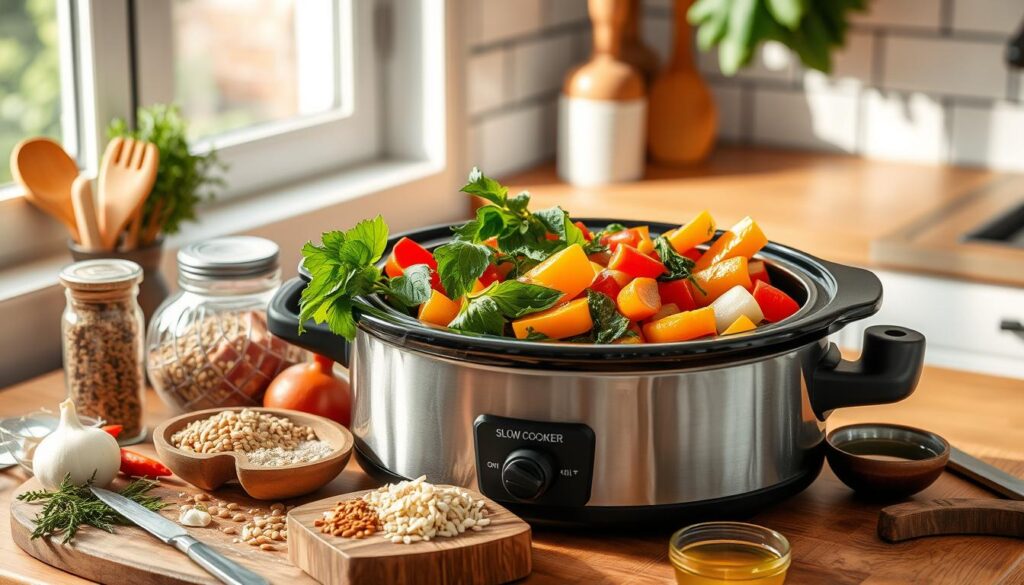
By following these simple tips, you can make a variety of delicious meals. Always keep food safety in mind and try new ingredients. This way, you’ll find your favorite dishes.
| Slow Cooker Tip | Description |
|---|---|
| Temperature Control | Ensure the slow cooker is set to the right temperature |
| Timing Ingredients | Add ingredients at the right time to prevent overcooking or undercooking |
| Food Safety | Always defrost ingredients and monitor the temperature |
Meal Prep Strategies for Busy Weeks
As a busy person, I’ve found that meal prep strategies are key to a healthy life. By planning my meals, I save time and eat well all week. Many agree that meal prep helps save time and eat healthy.
To start meal prep, make a plan that fits your life. This might include:
- Planning meals for the week
- Preparing ingredients in bulk
- Cooking meals ahead and storing them
These meal prep strategies save time and cut down on waste. It’s also crucial to choose healthy foods. This means picking whole foods like fruits and veggies over processed ones.
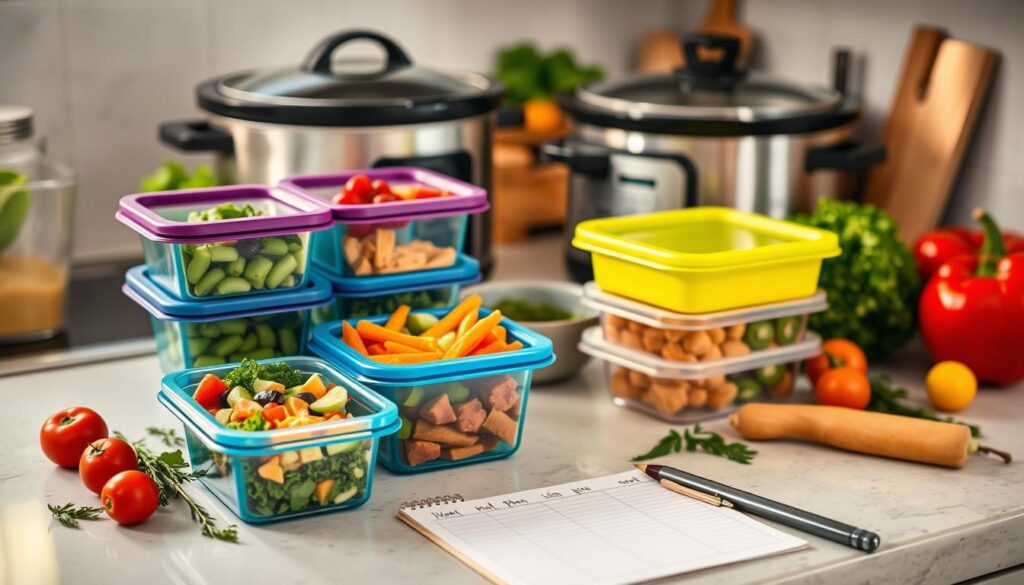
Meal prep is not just about saving time, it’s also about taking control of your health and wellbeing.
By using meal prep strategies and healthy meal planning, you can boost your health. Stay consistent and adjust your plan as needed to keep it working for you.
| Meal Prep Strategy | Benefits |
|---|---|
| Planning meals in advance | Saves time, reduces food waste |
| Preparing ingredients in bulk | Saves time, reduces food waste |
| Cooking meals in advance | Saves time, ensures healthy meals |
My Favorite Protein-Packed Crockpot Dishes
I’m always searching for tasty and healthy meals. That’s why I love protein-packed crockpot recipes. They’re simple to make, full of protein, and great for weeknights. Experts say protein is key for a healthy diet, and crockpots are a great way to cook it.
Some of my top picks include:
- Chicken and black bean chili, made with lean chicken breast and black beans, a great source of plant-based protein
- Salmon and quinoa bowl, featuring grilled salmon and quinoa, a complete protein and a great source of healthy fats
- Lentil and vegetable stew, a hearty and comforting dish made with red lentils and a variety of vegetables, providing a boost of healthy protein sources
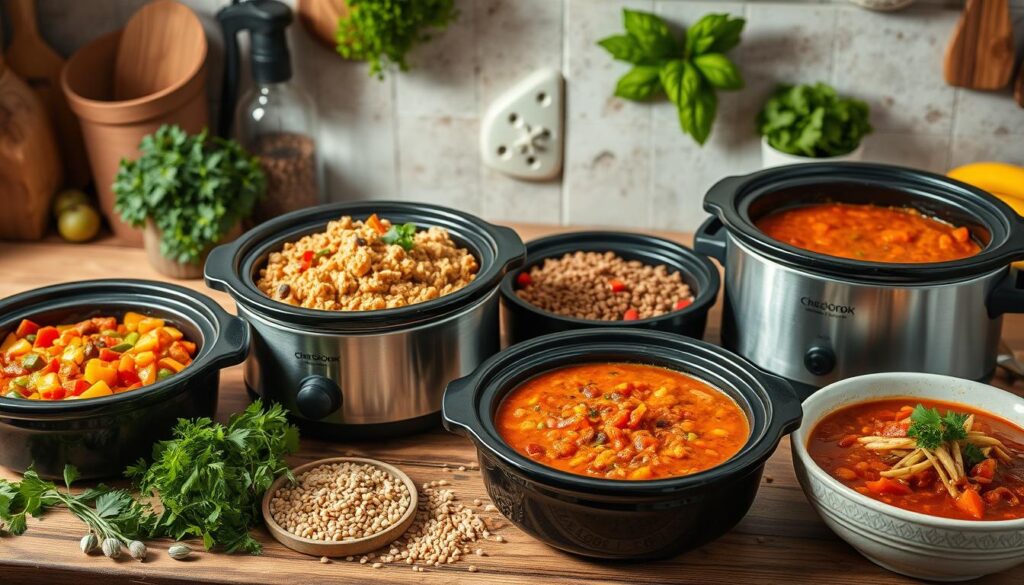
Lean Meat Options
Lean meats like chicken, turkey, and beef are full of protein. They’re perfect for crockpot recipes. Choose lean cuts and trim fat to keep your meals healthy.
Plant-Based Alternatives
Beans, lentils, and tofu are great plant-based protein sources. They’re lower in fat and calories, making them a healthy choice.
Fish and Seafood Selections
Fish and seafood are also high in protein. Choose sustainable and low-mercury options like salmon, cod, and shrimp for a healthy meal.
Vegetable-Rich Slow Cooker Combinations
Exploring healthy cooking, I’ve learned the value of vegetable-rich slow cooker recipes. A slow cooker makes it easy to cook tasty, nutritious meals. You can make everything from hearty stews to flavorful soups and casseroles.
My top picks include lentil soup, roasted vegetable stew, and quinoa and black bean bowls. These dishes are not only delicious but also full of vitamins and minerals. Using a slow cooker means less work for me, and a healthier meal.
Here are some tips for making your own vegetable-rich slow cooker recipes:
- Choose a variety of colorful vegetables for a range of nutrients
- Try different spices and seasonings to add flavor
- Add lean proteins like chicken or tofu for extra nutrition
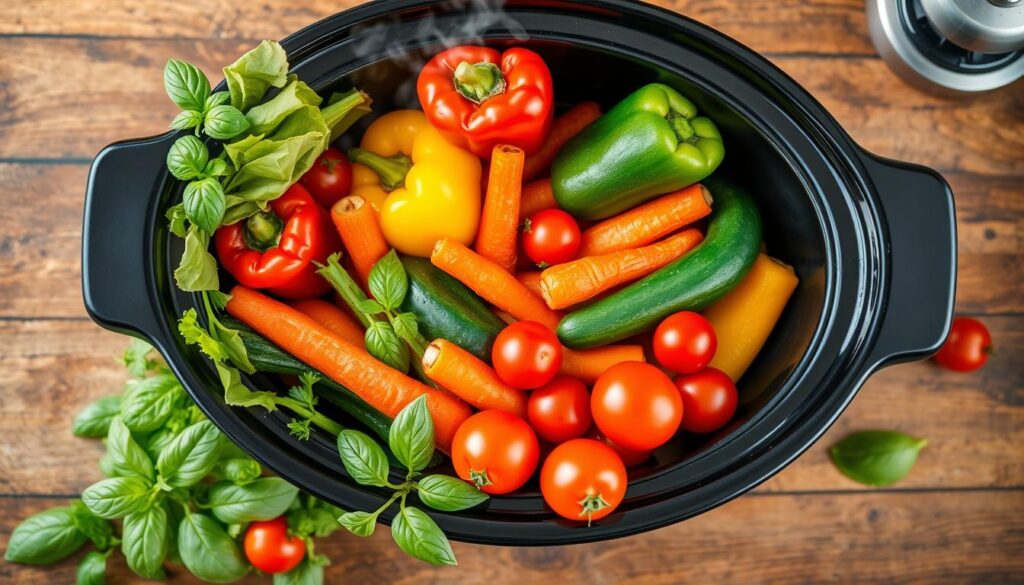
By adding healthy vegetable options to my slow cooker recipes, I’ve made meals that are both tasty and nutritious. Whether you’re busy or love cooking, try vegetable-rich slow cooker recipes and see the difference for yourself.
Smart Substitutions for Healthier Results
Exploring healthy crockpot recipes has shown me the value of smart substitutions. These swaps help cut down on calories, sodium, and fat. Experts say they greatly improve our health and wellbeing.
Simple substitutions include choosing low-sodium options, cutting saturated fats, and using natural sweeteners. For instance, I use low-sodium broth to lower sodium in dishes. I also prefer healthier fats like olive or avocado oil over saturated fats.
Lower-Sodium Options
Lower-sodium ingredients are a good starting point. I love using herbs and spices for flavor without salt. Salt-free seasoning blends also add depth to my meals.
Reducing Saturated Fats
Reducing saturated fats is crucial. I choose leaner meats, plant-based options, and less full-fat dairy. These changes help me make healthier, balanced meals.
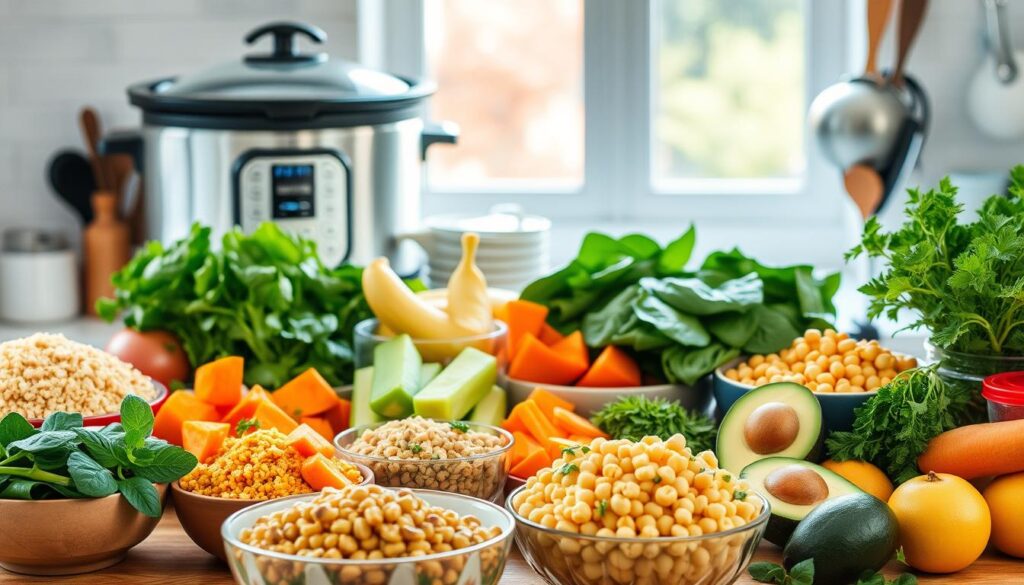
Natural Sweetener Alternatives
Natural sweeteners like honey, maple syrup, and stevia are great for less sugar. I use them sparingly to keep my diet healthy.
By using these substitutions, I’ve made my meals healthier and more balanced. They nourish my body and taste great. I encourage everyone to try these swaps and find what works for them.
Storage and Leftovers Guide
Exploring healthy crockpot recipes shows me how key food storage and leftover management are. These two are vital for keeping food safe and cutting down on waste. Here, I’ll share tips on safely storing crockpot meals and turning leftovers into tasty new dishes.
First off, understanding food storage basics is crucial. This means using airtight containers, labeling, and dating your food. This way, your meals stay fresh and safe. For leftover management, think creatively. Use leftovers to make new meals, saving time and reducing waste.
- Use airtight containers to store food
- Label and date your stored food
- Plan meals around leftovers to reduce waste
By following these easy tips, you’ll get the hang of food storage and leftover management. Proper storage and handling leftovers are essential for enjoying healthy meals and cutting down on waste. 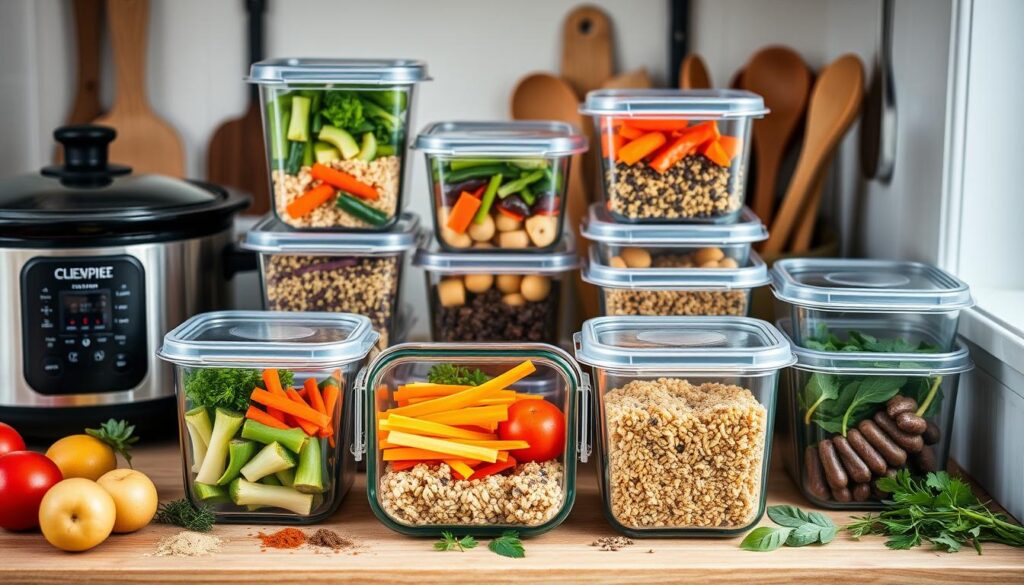
Proper food storage and leftover management are essential for maintaining a healthy and sustainable kitchen. By implementing these simple strategies, you can enjoy your favorite crockpot recipes while reducing food waste and promoting a more environmentally friendly approach to cooking.
Conclusion: Making Healthy Crockpot Cooking Your New Lifestyle
Healthy crockpot cooking offers many benefits. It saves time, improves health, and is budget-friendly. By learning to make perfect crockpot meals, you can enjoy a healthier lifestyle.
Start by planning your meals and using smart ingredient swaps. Try new recipes and add your favorite crockpot dishes to your weekly menu. With a bit of effort, you’ll make healthy crockpot cooking a lasting part of your life.

